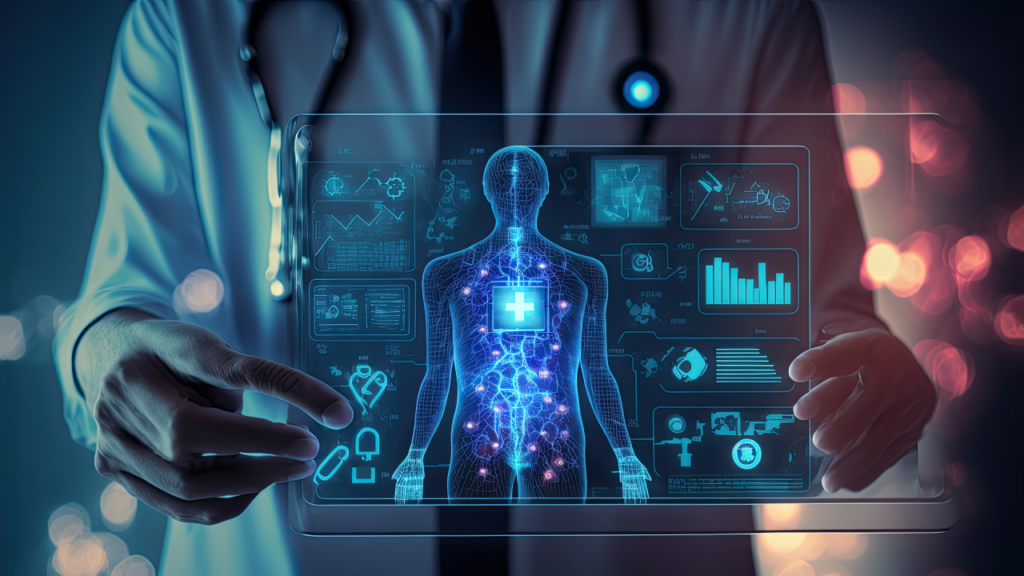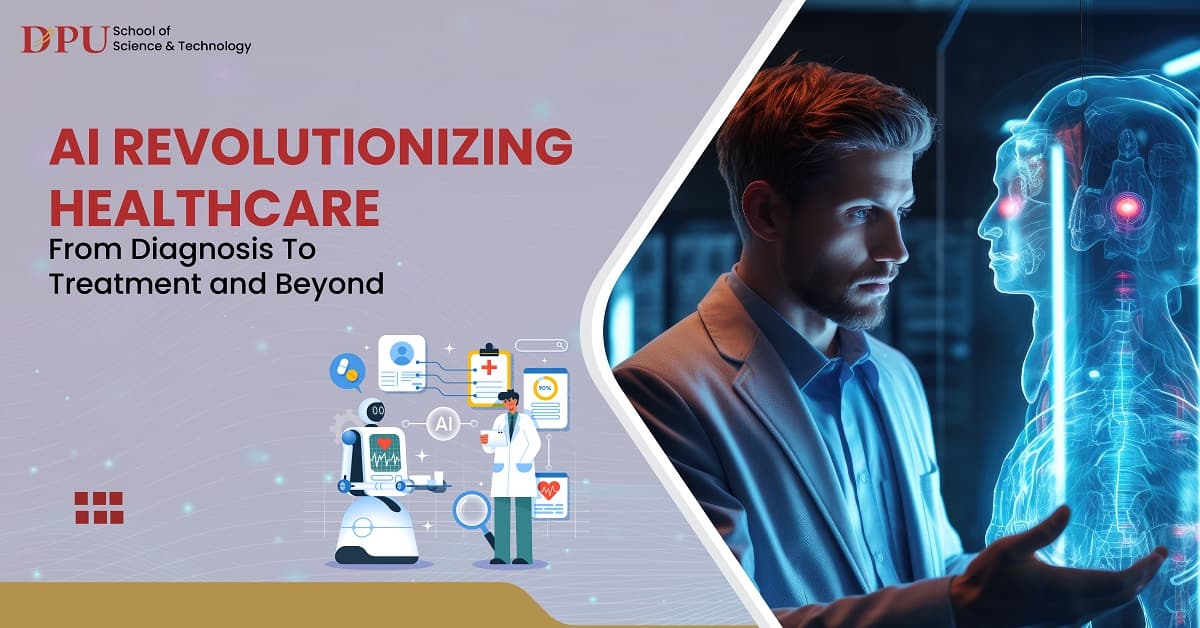From data to diagnosis, artificial intelligence (AI) is transforming the healthcare industry with speed, precision, and innovation. In the past, diagnosis relied heavily on human expertise, experience, and lengthy procedures. But today, AI is providing faster analysis, earlier detection, and more accurate treatment recommendations, all powered by vast amounts of medical data.
Healthcare is no longer only about stethoscopes and scalpels it’s about algorithms, data science, and real-time intelligence. As we explore how AI is revolutionising healthcare, it becomes clear that this transformation is not just a trend but a necessary shift that is saving lives.
What Is AI in Healthcare?
Artificial intelligence in healthcare refers to the use of machine learning algorithms and software to analyse, interpret, and act on complex medical data. The goal is to assist doctors and healthcare providers in diagnosing diseases, predicting outcomes, recommending treatments, and improving overall patient care.
From analysing MRI scans to predicting cancer risk, AI tools can process large volumes of data in seconds something human professionals would need hours or days to do.
Early Disease Detection
One of the most powerful impacts of AI in healthcare is early detection of diseases, especially life-threatening conditions like cancer, heart disease, and stroke. AI algorithms trained on thousands of medical images can detect signs of disease even before symptoms appear.
For example, Google’s DeepMind has developed AI systems capable of spotting over 50 eye diseases with expert-level accuracy. Similarly, AI tools have been used to identify breast cancer in mammograms more accurately than human radiologists.

Faster and Accurate Diagnoses
AI is also speeding up diagnosis time. Doctors can now rely on AI-powered systems to support clinical decisions. Tools like IBM Watson Health or Aidoc are assisting physicians in diagnosing diseases through AI analysis of medical images, patient histories, and laboratory data.
This is particularly useful in emergency settings, where time is critical. An AI system can scan a patient’s CT scan and identify a brain haemorrhage within minutes saving lives when every second matters.
Personalised Treatment Plans
No two patients are the same. AI helps doctors create customised treatment plans based on individual medical history, lifestyle, genetics, and treatment response. By learning from past data, AI can suggest which medications are likely to be more effective for a particular patient.
This approach, often called precision medicine, increases the chances of recovery and reduces side effects. With AI, treatments are no longer one-size-fits-all.
Predictive Analytics and Risk Assessment
AI can predict the likelihood of disease outbreaks, patient readmission, and even the success of surgeries. Hospitals and clinics are using predictive analytics to identify high-risk patients and act before complications arise.
For instance, AI can analyse electronic health records (EHRs) and alert doctors when a diabetic patient is at risk of developing complications. This proactive approach leads to better management and fewer hospital admissions.
Virtual Health Assistants and Chatbots
AI-powered chatbots and virtual assistants are helping patients manage their health at home. From reminding patients to take their medicine to answering common medical questions, these tools are improving patient engagement and reducing the burden on healthcare providers.
Some apps, like Babylon Health and Ada, offer AI-driven consultations that guide users through their symptoms and suggest possible causes or next steps. This enhances access to healthcare, especially in remote or underserved areas.
Robotic Surgery and Automation
AI is also involved in robot-assisted surgeries where machines perform complex procedures with higher precision and lower risk of error. These systems use AI to plan surgeries based on patient data, ensuring minimal invasion and faster recovery times.
Additionally, automation powered by AI is improving operational tasks in hospitals—from managing medical records to scheduling surgeries and reducing paperwork.
Drug Discovery and Development
Creating a new drug used to take over a decade. With AI, the time and cost have been significantly reduced. AI tools can analyse chemical structures and simulate how a new drug would react in the body, speeding up clinical trials and increasing the chances of success.
During the COVID-19 pandemic, AI played a key role in accelerating vaccine research and identifying potential antiviral compounds.
Challenges and Ethical Concerns
Despite the positive impact, there are challenges in using AI in healthcare. Issues include:
- Data privacy and protecting sensitive patient information
- Bias in AI algorithms, which may lead to unequal treatment outcomes
- Lack of transparency, as some AI systems function like “black boxes” with unclear reasoning
Ensuring that AI is used ethically, responsibly, and with human oversight is crucial to building trust in this technology.

The Future of AI in Healthcare
The future of healthcare is deeply tied to artificial intelligence and data-driven innovation. As technology continues to advance, AI will play a growing role in remote monitoring, mental health support, wearable devices, and home-based care.
With regulatory support and proper training, AI will not replace doctors but will become a vital tool to help them deliver better, faster, and safer care.
Conclusion
From data to diagnosis, AI is revolutionising healthcare in powerful ways. It improves accuracy, enhances treatment, and offers personalised care while reducing cost and time.
As we embrace these tools, the focus must remain on responsible implementation, human oversight, and the goal of providing better health outcomes for everyone.
The digital transformation of medicine is not just about machines it’s about saving lives through smarter care.
Do follow Gulf Magazine on Instagram
Also read – Lower your risk of early death by some 40% with this lifestyle change



